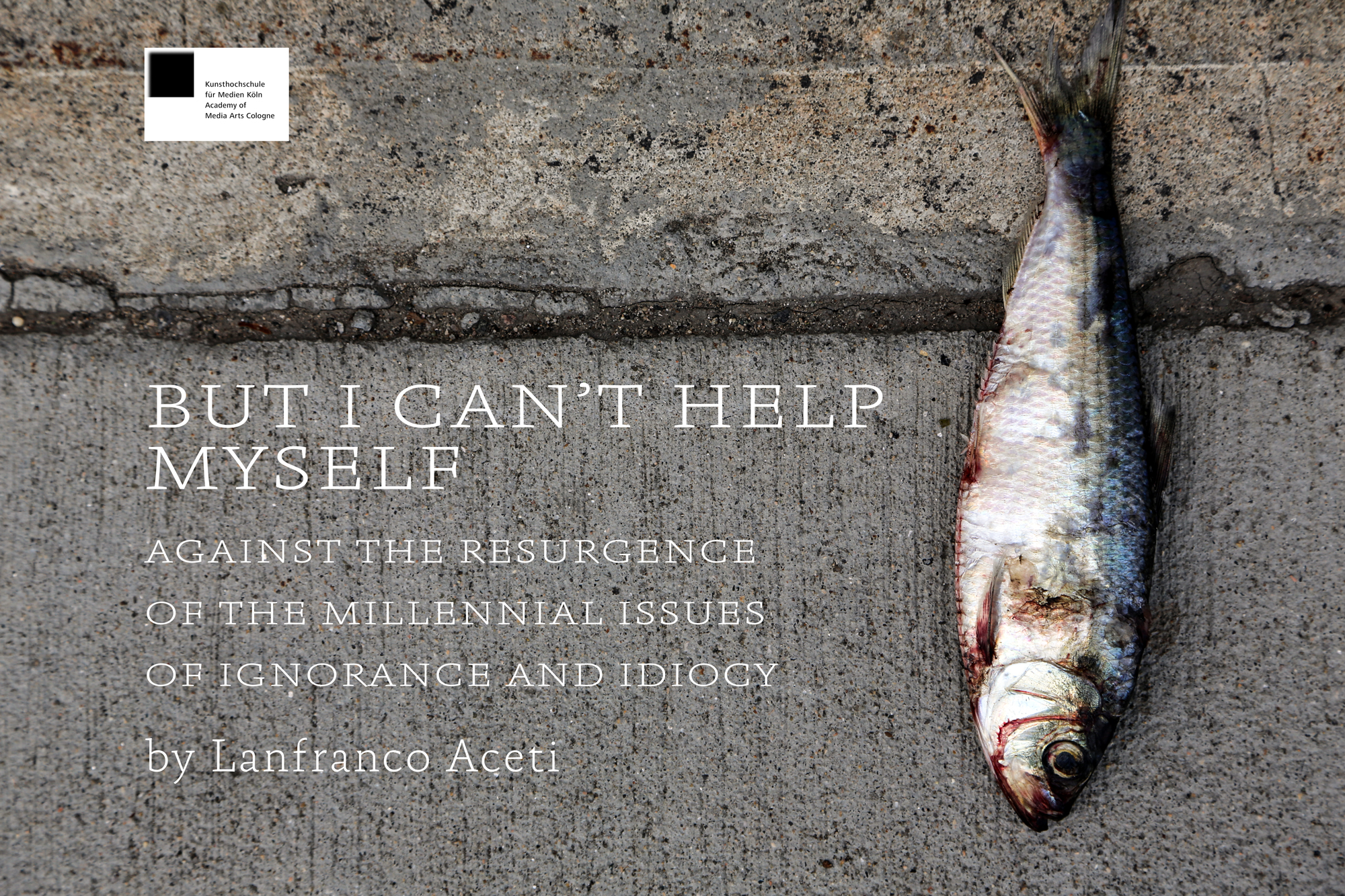But I Can’t Help Myself: Against the Resurgence of the Millennial Issues of Ignorance and Idiocy is Lanfranco Aceti’s inaugural lecture at the Academy of Media Arts Cologne (KHM). The lecture focuses on the role of contemporary politics in reshaping our understanding of society and the modalities for practicing art. Professor Aceti introduces a series of concepts and frameworks to define his aesthetic approaches beyond the current issues of ignorance and idiocy. The inaugural lecture is scheduled for Tuesday, June 12, 2018, at 7 pm at KHM.
Abstract
In more ways than one the third millennium has been a disappointment, at least for these first eighteen years. Far from ushering in a new age of enlightenment, amiability, and acceptance, it has infected our lives with a resurgence of miserization, class divisions, and collapse of ethical values. To use the words of someone who the author considers a great politician and an icon of matriarchal values in the twenty-first century, former British MP and actress Glenda Jackson, people know “the price of everything and the value of nothing.” [1]
We are now witnessing the post-postmodern results of the seeds that have been planted to dismantle the very ideas of society, civility, and conviviality. The resurgence of nationalism, racism towards migrants, and national isolationism are the obvious results of a myopic globalization for the few, corporate dismissal of other people’s struggles, and a fundamental lack of empathy as global political policy. The events related to the financial collapse of Greece and the EU policy towards migration and race are two blaring and glaring examples of contemporary violent and unethical policies. The current social upheavals, particularly within the western world, are layered in a socio-political context that has favored and continues to incite anger, thereby promoting its final result violence as functional policy. Anger and violence in all of their forms (verbal, physical, psychological, political, and etc.) have increasingly and incredibly become forms of legitimized response.
The stark choice that the millennial victims of capitalism are left with is, therefore, that of viasmopolitics [2] as legitimate response in order to re-establish their participation within a society from which they have been excluded and within which are nevertheless chained and obliged to struggle. If post-democracies have produced post-citizens, as the writer has argued, the politics of rape and violence conducted by the states or by meta-institutions towards established notions of society as convivium are generating plebiscitarian responses of counter-violence.
Viasmopolitics, the politics of rape and violence, are the modality through which the contemporary “necropolitics” [3] are being delivered and are the “plagues of the ‘new world order’.” [4] If the plague of viasmopolitics for Jacques Derrida would represent ineluctable events, in this context the politics of rape and violence are actually either the result of a willful choice or the inevitable consequence of social, corporate, and political ignorance and idiocy.
The disenfranchisement of post-citizens, as a consequence of viasmopolitics, leads to a division between the state and the citizens in which both perceive each other as enemies and engage in a spiral of institutional destruction in order to deliver their own brand of ‘change.’ “Il sesso è politica?” “Naturalmente” [5] “Is sex politics?” “Naturally” is Pier Paolo Pasolini’s response. It is in the contemporary politics of sex, rape, and violence that a clearer understanding of society appears in what has become the institutionalized vicious circle of viasmopolitics as a form of oppression and retribution.
Keywords: Viasmopolitics, necropolitics, violence, anger, rape, post-democracy, post-citizen
[1] Barnet Bugle, “Glenda Jackson Launches Tirade against Thatcher in Tribute Debate,” YouTube Video, April 10, 2013, https://youtu.be/SfsZjoD2Frk, (accessed May 31, 2018).
[2] Viasmopolitics, in the definition of the author, are the violently sexualized politics of dismantlement of social structures that subjugate people while impeding and delegitimizing their right to criticism and protest.
[3] Achille Mbembe, “Necropolitics,” Public Culture 15, no. 1 (Winter 2003): 11-40.
[4] Jacques Derrida, Specters of Marx: The State of the Debt, the Work of Mourning, and the New International, trans. by Peggy Kamuf (New York and London: Routledge, 1994), 91.
[5] Pier Paolo Pasolini, Interview with Pier Paolo Pasolini, October 31, 1975, YouTube Video, August 5, 2009, https://www.youtube.com/watch?reload=9&time_continue=68&v=w9Ef1y_OY-U (accessed May 31, 2018).


